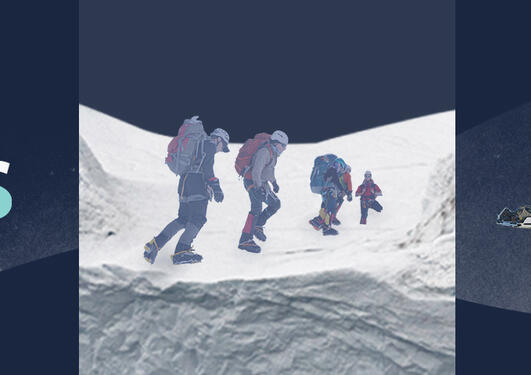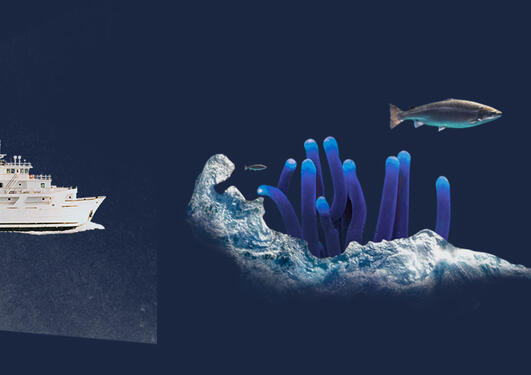Research possibilities for the MSCA SEAS postdoctoral research fellow in air-sea interaction
he information on this page is a supplement to the complete advertisement of the position in the recruitment-portal Jobbnorge. The full advertisement of this position in Jobbnorge will be available after august 1, and linked from this webpage. Call deadline is October 31, 2022.
Main content
Key information
One position | MSCA SEAS postdoctoral research fellow at the Geophysical institute |
Jobbnorge title | MSCA SEAS postdoctoral research fellow in air-sea interaction |
Topical frame | Atmosphere-Ocean interactions in the Nordic Seas |
Supervisor team | Professor Ilker Fer and Professor Thomas Spengler |
Mobility | For an incoming candidate, see mobility rules |
Unit of employment | The Geophysical institute at University of Bergen |
Group affiliation(s) | Physical oceanography group/Meteorology group/Bjerknes Centre for Climate Research |
Thematic area and contact
This interdisciplinary position is connected to the research groups on physical oceanography and meteorology at the Geophysical Institute, UiB. The position offers the possibility to do research on air-sea-interaction processes influencing the Nordic Seas’ ocean circulation and hydrography, combining state-of-the-art observation technology and models.
The position is open to an incoming candidate, see mobility rules.
The successful candidate will be employed at the Geophysical Institute, University of Bergen and included in the dynamic research environment within the Bjerknes Centre for Climate Research.
Information about the supervisor, research group and research possibilities for the fellow is available below. For further details about the research possibilities please contact Professors Ilker Fer (physical oceanography) and Thomas Spengler (dynamic meteorology).
Research possibilities and resources
Background and research topic: The ocean stores the vast majority of heat in the climate system and distributes this heat, nutrients, carbon dioxide, and salts around the globe. Exchange occurs with the atmosphere at the surface and with surrounding waters along the pathways of major ocean currents. The Nordic Seas are a key transit region for the Atlantic Meridional Overturning Circulation, crucial for Earth’s climate with its poleward flowing warm, saline Atlantic Water that is progressively cooled and densified. The Norwegian Sea forms a large heat and salt reservoir with substantial air-sea interactions, intense atmospheric phenomena such as polar lows and cold air outbreaks, large wintertime heat losses, and intense mesoscale eddy activity. These processes, interactions, and feedbacks are particularly enhanced in frontal regions, which are also key to fisheries due to associated upwelling providing nutrients. Despite the significance of these processes, there are still shortcomings in our understanding of these crucial air-sea interactions and how they affect the upper ocean stratification, distribution of nutrients, and energy transfers in the ocean across scales.
The target region features several distinct fronts, the most prominent being the front between the Atlantic and Arctic waters between the Norwegian and Greenland seas over the Mohn Ridge and a persistent vortex in the Norwegian Sea. The prominence of these temperature gradients allows for idealized studies of air-sea interaction combining observations and models. Over the past decade, we have collected high-resolution oceanographic data using a combination of state-of-the-art measurements from ship and autonomous, robotic platforms, enabling detailed process studies in the ocean ranging from regional to small scales. In addition to ongoing collection of new data using ocean gliders, moorings, and ships, the novel satellite product from SWOT (Surface Water and Ocean Topography) will be available from late 2022, providing unprecedented wide-swath and high-resolution observation of the sea surface elevation variability.
The project aims to combine ocean glider observations with atmospheric data and idealized numerical models, addressing coupled atmosphere-ocean processes, the oceanic response, and feedback mechanisms. In particular, we will focus on (a) the impact of severe atmospheric events during winter on the mixed layer development in the Nordic Seas, (b) the energy transfer in the ocean from the mesoscale and submesoscale down to mixing scales at the baroclinic front along the Mohn Ridge and in a quasi-symmetric vortex in the Norwegian Sea under different forcing conditions, (c) subduction rates and meso/submesoscale dynamics and variability across the Mohn Ridge, and (d) on processes and feedbacks between the atmosphere and ocean.
Opportunities and infrastructure: (1) Field studies and data collection from research cruises, moorings, and ocean gliders including infrastructures NorGliders and NorEMSO; (2) possibility to be trained and participate in operations as a ocean glider pilot; (4) access to high-quality data from the Nordic Seas; (3) integration in a multi-disciplinary research group within the Bjerknes Centre for Climate Research.
Supervisors: Ilker Fer (PhD, 2001, EPF-Lausanne, Switzerland) is professor of physical oceanography at the Geophysical Institute, University of Bergen. He is the leader of the research infrastructure, “the Norwegian node for the European Multidisciplinary Seafloor and water column Observatory” (NorEMSO), and of the “Norwegian National Facility for Ocean Gliders (NorGliders)”. His research interests cover meso to small scale processes in physical oceanography with special attention to high-latitudes, ocean mixing and turbulence, and atmosphere-ocean-ice interaction. He is an observational oceanographer with field experience at sea and on ice, and has led more than 25 expeditions since 2000. Fer has expertise in collecting, processing and analysing data from conventional ship and moored instruments, as well as from various complex platforms including microstructure profilers, gliders, moored profilers, and eddy-covariance systems. He has extensive experience in leading projects, publication of research results as well as supervision of graduate students and post-doctoral researchers.
Thomas Spengler (PhD, 2008, ETH Zurich, Switzerland) is a professor in meteorology at the Geophysical Institute, University of Bergen. He is the leader of the dynamic meteorology group and director of the Norwegian research school on Changes in Coupled Earth System (CHESS). Spengler has worked extensively on air-sea interactions in the higher latitudes, focusing on extreme polar weather phenomena, such as polar lows and cold air outbreaks. He has a particular interest in air-sea interactions and their role on the couple climate system. Spengler has expertise in theoretical and numerical model simulations addressing air-sea interactions, where he focuses on detailed process understanding mapping sensitivities of the coupled system. He has significant experience in leading research projects as well as supervision of graduate students and postdocs, and has a respectable publication record.
International collaboration possibilities: Scripps Institution of Oceanography and University of Washington, USA; Mediterranean Institute of Oceanography, France; University of East Anglia, UK; Institute of Atmospheric Physics, Chinese Academy of Sciences, China.
Impact of research project: Understanding the physical processes and feedback mechanisms of the coupled atmosphere-ocean system has significant ramifications for our knowledge regarding implications for the oceanic ecosystem including its biosphere. Atmosphere-ocean interactions in this crucial region of the Nordic Seas have influences both globally, through the Atlantic Ocean overturning, and locally on weather, ocean circulation, ocean ecosystem and fisheries in the Nordic Seas. With the warm and salty Atlantic Water being subject to the greatest heat losses anywhere in the Nordic Seas, the Norwegian Sea is a key player in global climate. These heat exchanges and upwelling associated with ensuing changes in ocean circulation also matter to fisheries, because the advection of nutrient rich waters support the entire food chain, sustaining the productivity around Norway.
See the full advertisement in Jobbnorge
The full advertisement in Jobbnorge will be available from august 1, 2022, until call deadline October 31.
Important general information
Please be aware
- That until August 1st 2022 (official call opening), the information on this page must not be considered as final, as adjustments may be done! There might also be minor adjustments in the Guide for applicants and the templates needed for applying.
- That the application process is time-demanding and requires a close dialogue with name-given available faculty supervisor or contact who, close to the deadline, must sign a supervisor match declaration if an application is to be eligible.
- That some fields of research, especially within sensitive technology areas, might be enforced by Norwegian and international regulations regarding Control of the Export of Strategic Goods, Services and Technology. Candidates who by assessment of the application and attachment are seen to conflict with the criteria in these regulations might be prohibited from recruitment to UiB.

